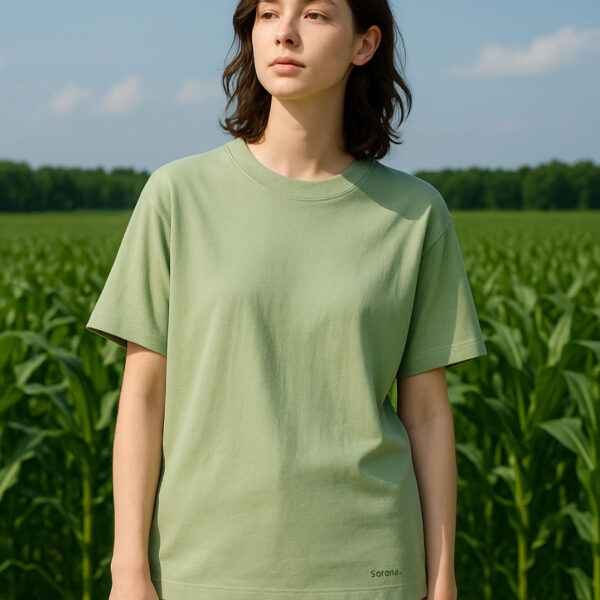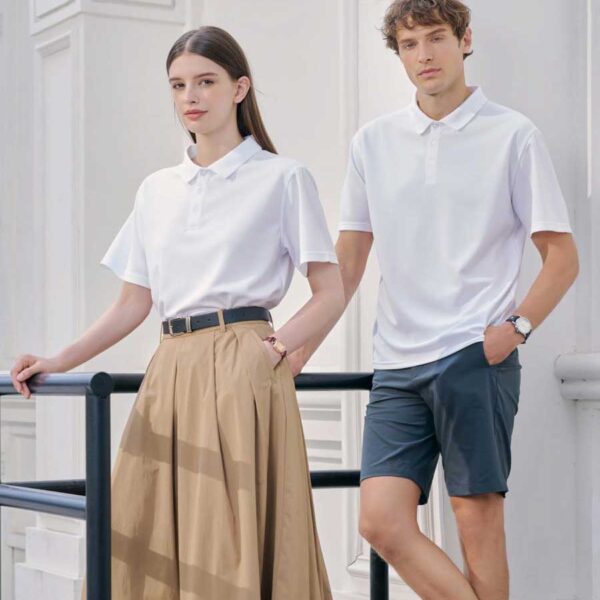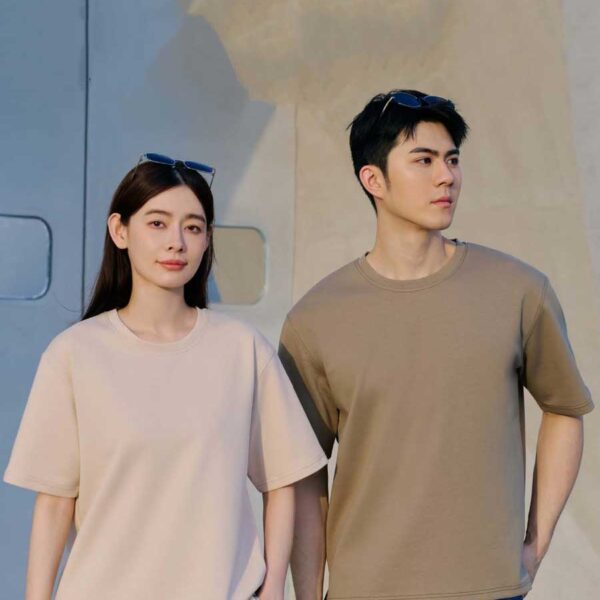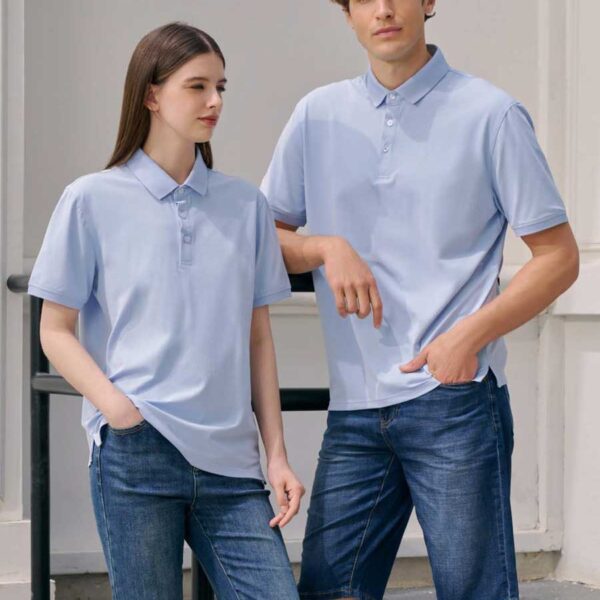Discover the Future of Sustainable Fabrics
Is Sustainability Only About Recycled Materials?
Discover how both recycled textiles and plant-based fibers play a role in sustainable fashion. From GRS-certified materials to bio-based innovations like Sorona®, the world of eco-friendly fabrics is evolving.
♻ GRS: The Gold Standard for Recycled Textiles
Recycled Material Verification
Ensures that the materials used in production are genuinely recycled, contributing to a sustainable future.
Safer Chemical Usage
Guarantees that all chemicals used in the manufacturing process are safe and environmentally friendly.
Ethical Sourcing Audited
Confirms that all sourcing practices are ethical, ensuring fair labor conditions and responsible sourcing.
Why Sustainable Materials Matter in Business
Sustainability is transforming from a mere trend to a fundamental aspect of modern business practices. Companies are increasingly aware that their material choices impact not only the environment but also consumer trust and brand longevity. Today’s consumers are more informed about the origins of their clothing, and businesses that align with these values are gaining a significant advantage.
Incorporating certified sustainable materials such as recycled polyester, Sorona®, or organic cotton into your products can help achieve ESG (Environmental, Social, Governance) objectives, minimize ecological footprints, and showcase ethical sourcing. Whether you are launching a new fashion line, operating a printing service, or managing corporate uniforms, your material choices convey a powerful message.
Even if your entire product line isn’t fully sustainable, taking transparent, incremental steps enhances credibility and distinguishes your brand in a competitive marketplace.
🔍 What Makes a Fabric Sustainable?
Recycled Polyester (rPET)
Made from used plastic bottles, this fabric helps reduce landfill waste and uses less energy than virgin polyester.
Recycled Cotton
Created from fabric scraps or used garments. It saves water and avoids textile waste. ⚠️ Important: This is not the same as organic cotton.
Recycled Nylon
Sourced from fishing nets and nylon waste. Lightweight and durable — ideal for outerwear, bags, and activewear.
Bio-Based Fiber (e.g., Sorona®)
Derived from renewable corn-based ingredients. Offers softness, stretch, and lower fossil-fuel dependency — without being recycled.
There are many ways to make fabric more sustainable, whether through recycling, reusing, or replacing fossil-based materials. Below are just a few common examples of eco-friendly textiles used in today’s apparel. Each of them plays a role in reducing waste, conserving energy, or lowering environmental impact.
Sorona®: Plant-Based, Not Recycled
Sorona® is a fiber made from renewable plant-based ingredients, such as industrial corn. Developed by DuPont™, it is not recycled, but contributes to sustainability through lower energy use and reduced emissions. It blends softness, stretch, and long-term durability.
Eco-Friendly Composition
With 🌱 37% plant-based by weight, Sorona® is a step towards a more sustainable future.
Lower Carbon Emissions
Manufacturing Sorona® results in significantly lower CO₂ emissions, making it a greener choice for conscious consumers.
Softness and Durability
Enjoy the perfect balance of softness and stretch, combined with long-lasting durability that withstands the test of time.
Certified Safety
Backed by independent certifications, Sorona® ensures safety and sustainability without compromising on quality.
Sorona® Certifications Overview
Because Sorona® is not a recycled material, it does not qualify for GRS certification. However, it holds recognized certifications confirming safety and sustainability.
USDA Certified Biobased Product
This certification confirms that Sorona® contains 37% plant-based content, highlighting its commitment to using renewable resources.
OEKO-TEX® Standard 100
Ensuring that Sorona® is free from harmful substances, this certification guarantees that the product is safe for direct skin contact.
ISO-compliant Life Cycle Assessment (LCA)
Through comprehensive assessments, this certification demonstrates Sorona®’s reduced environmental impact throughout its lifecycle.
Independent Lab Tests
Verified by independent labs, Sorona® is confirmed to be free of formaldehyde, with low VOC emissions and exceptional durability.
Certifications & Sustainability Paths
GRS (Recycled Standard)
Verifies recycled material content in fabrics
Chain of custody, social & environmental practices, chemical restrictions
Fabrics made from post-consumer or industrial recycled content
Transparency & traceability for recycled textiles
Sorona® Certifications
Bio-based (USDA Certified Biobased – 37% from corn)
OEKO-TEX® Standard 100 – Tested for harmful substances
LCA-Compliant – Lower carbon footprint verified by ISO standards
Plant-based innovation with safety and performance proven by third-party labs
OEKO-TEX® Standard 100
Ensures fabric is tested for harmful substances
Both synthetic and natural textiles
Safety for direct skin contact, especially in garments
Health and chemical safety assurance for consumers
It’s important to note that while many Sorona®-based materials carry certifications such as USDA Biobased, OEKO-TEX®, and verified LCA results, the actual certifications may vary depending on the specific supplier and manufacturing process. This comparison is intended to provide general insight into the sustainability characteristics of different fabric types, and should not be interpreted as a certification guarantee for any specific product.
Understanding Sorona® Certifications
Sorona® fabrics are widely recognized for their sustainability and eco-friendly properties. However, the certifications that support these claims can vary based on the supplier and production methods used. It’s essential to consult with your supplier for specific certification details.


USDA Biobased Certification
The USDA confirms that certain Sorona® fabrics contain a significant percentage of renewable biological ingredients, contributing to reduced reliance on fossil fuels and promoting environmental sustainability.
OEKO-TEX® Standard 100
Fabrics certified under OEKO-TEX® Standard 100 have been tested for harmful substances, ensuring they are safe for human use. This certification is crucial for maintaining high safety standards in textile production.
Third-Party LCA Studies
Life Cycle Assessment (LCA) studies conducted by independent third parties provide insights into the overall environmental impact of Sorona® fabrics throughout their lifecycle, from production to disposal.
Showcase of Sustainable Products




🌍 Why Choosing Sustainable Clothing Makes a Difference
Every purchase has an impact and sustainable materials help create a better planet.
By choosing garments made with recycled or bio-based fabrics, we help reduce textile waste, save water, and lower CO₂ emissions. One shirt might seem small, but collective choices from brands and consumers alike can drive real change in the fashion industry.
That said, it’s important to understand that truly 100% sustainable or fully recycled garments are extremely rare in today’s textile world. Most eco-friendly clothing uses a blend of recycled or plant-based fibers together with conventional materials to maintain durability, softness, and wearability.
For example, recycled cotton often needs to be mixed with virgin cotton for strength, and recycled polyester may still rely on new fibers for structural stability. These blends help strike a balance between sustainability and product quality. While these garments may not be entirely sustainable in composition, each responsible material choice still contributes to lowering the overall environmental impact.
Start with your shirt and let it spark a movement.
Join Our Sustainability Journey
Discover the Impact of Your Choices
Every fabric choice tells a story. If you’re curious about any of our eco-friendly materials, or simply want to know more before making a choice feel free to get in touch. We’re happy to chat, share what we know, or help you find the right piece. Sustainable steps don’t have to be perfect just real.




